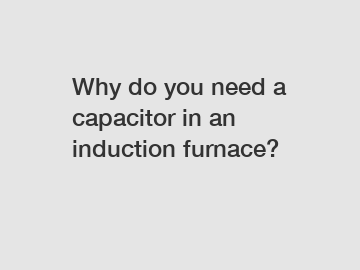Why do you need a capacitor in an induction furnace?
TY-induction are exported all over the world and different industries with quality first. Our belief is to provide our customers with more and better high value-added products. Let's create a better future together.
Why do you need a capacitor in an induction furnace?
Induction furnaces are used in various industrial applications for melting metals. They operate by generating an electromagnetic field that heats the metal to its melting point. One crucial component in an induction furnace is a capacitor. But why do you need a capacitor in an induction furnace? Let's explore this question in more detail.

1. What is a capacitor in an induction furnace?
A capacitor is an electronic component that stores electrical energy in the form of an electric field. In an induction furnace, the capacitor is used to store energy that is transferred to the metal being melted. This stored energy helps maintain the high-frequency oscillations required to heat the metal efficiently.
2. Improving power factor.
One of the main reasons why a capacitor is essential in an induction furnace is to improve the power factor. The power factor is a measure of how effectively electrical power is being converted into useful work. In an induction furnace, the power factor can be improved by using a capacitor to correct the phase angle between the voltage and current.
3. Enhancing energy efficiency.
By improving the power factor, the capacitor helps make the induction furnace more energy-efficient. A higher power factor means that more of the electrical energy supplied to the furnace is converted into heat for melting the metal, rather than being wasted as reactive power.
4. Controlling the voltage and current.
Capacitors also play a crucial role in controlling the voltage and current in an induction furnace. They help stabilize the power supply and reduce fluctuations that can affect the heating process. By maintaining a constant voltage and current, the capacitor ensures a consistent and reliable performance of the furnace.
5. Reducing electrical stress.
Another reason why a capacitor is necessary in an induction furnace is to reduce electrical stress on the system. Capacitors help buffer and smooth out the electrical pulses generated during operation, protecting the components of the furnace from damage caused by sudden voltage spikes.
6. Enhancing system performance.
Overall, the presence of a capacitor in an induction furnace enhances the system's performance in terms of energy efficiency, power factor correction, and electrical stability. Without a capacitor, the furnace may experience irregular heating patterns, higher energy consumption, and a lower melting efficiency.
In conclusion, a capacitor is a vital component in an induction furnace for a variety of reasons. It helps improve the power factor, enhance energy efficiency, control voltage and current, reduce electrical stress, and enhance overall system performance. So, the next time you wonder why you need a capacitor in an induction furnace, remember its essential role in ensuring the furnace operates efficiently and effectively.
Click here to get more.
If you are looking for more details, kindly visit induction brazing minimal.



